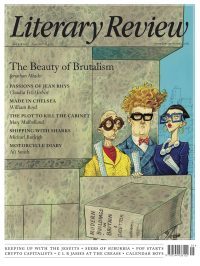Megan Walsh
When Worlds Collide
On the boom in Chinese science fiction
In ‘What Has Passed Shall in Kinder Light Appear’, a 2012 story by the young Chinese science fiction writer Bao Shu, the end of the world seems near. And yet, after a series of strange and dramatic flashes in the sky, the world keeps going, only now the arrow of time is reversed. Kicking off amid the pomp and optimism of the 2008 Beijing Olympics, the narrative takes the protagonist backwards in time to the mistakes and calamities of recent Chinese history: the hushed-up SARS outbreak, the Tiananmen Square massacre and the shattered hopes it left behind, the Cultural Revolution and the violent mania of Red Guards, and rising tensions with the Soviet Union as ballistic nuclear submarines patrol the seas.
Like much of the best speculative science fiction, the story has proved itself unsettlingly prescient. With the Chinese Communist Party’s attempts to downplay the coronavirus outbreak and its crackdowns on influential individuals and organisations, the People’s Republic now also finds itself complicatedly close to Russia. China may not yet have officially taken sides in the Russia–Ukraine conflict, but propaganda from the Kremlin is echoed in Chinese state media and circulated by legions of online nationalists, known as ‘Little Pinks’, in the ‘second battlefields’, or comment sections. The words ‘Russian invasion’ are banned on Weibo, one of the biggest social media platforms in China.
In both East and West, much populist rhetoric in recent years has been pegged to notions of national rejuvenation. And in China, where the Communist Party has been in power for the last seventy years, the past remains an occupied territory for which there is an agreed and celebratory

Sign Up to our newsletter
Receive free articles, highlights from the archive, news, details of prizes, and much more.@Lit_Review
Follow Literary Review on Twitter
Twitter Feed
It wasn’t until 1825 that Pepys’s diary became available for the first time. How it was eventually decrypted and published is a story of subterfuge and duplicity.
Kate Loveman tells the tale.
Kate Loveman - Publishing Pepys
Kate Loveman: Publishing Pepys
literaryreview.co.uk
Arthur Christopher Benson was a pillar of the Edwardian establishment. He was supremely well connected. As his newly published diaries reveal, he was also riotously indiscreet.
Piers Brendon compares Benson’s journals to others from the 20th century.
Piers Brendon - Land of Dopes & Tories
Piers Brendon: Land of Dopes & Tories - The Benson Diaries: Selections from the Diary of Arthur Christopher Benson by Eamon Duffy & Ronald Hyam (edd)
literaryreview.co.uk
Of the siblings Gwen and Augustus John, it is Augustus who has commanded most attention from collectors and connoisseurs.
Was he really the finer artist, asks Tanya Harrod, or is it time Gwen emerged from her brother’s shadow?
Tanya Harrod - Cut from the Same Canvas
Tanya Harrod: Cut from the Same Canvas - Artists, Siblings, Visionaries: The Lives and Loves of Gwen and Augustus John by Judith Mackrell
literaryreview.co.uk